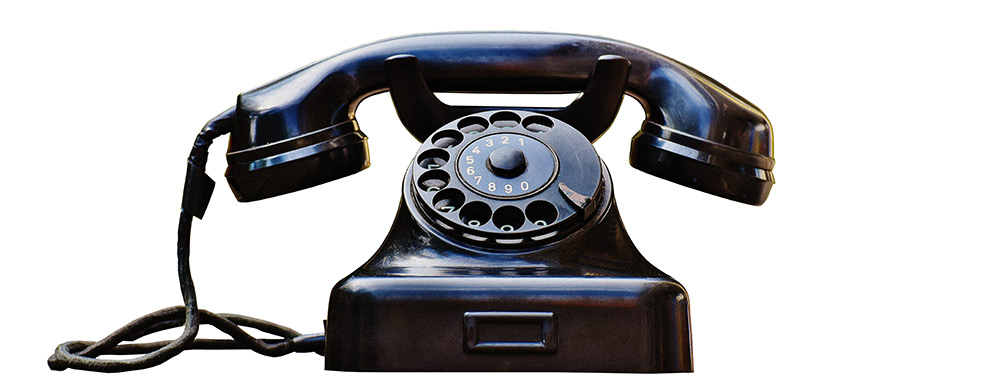
When the phone rings in our house, you will likely hear one of five children greet the caller with, “Greene House, this is Michael (or Donovan or Avery or Caleb or Kateri). May I ask who’s calling, please?” We have taught our children to follow this script as part of our family policy that phone etiquette is of utmost importance. Even if Kateri (our four-year-old) holds the phone like a walkie-talkie and doesn’t always know what to do with the telemarketer on the other end, her courteous response is a delightful surprise to most of our callers. Back in the day (aka the 1980s), one of the worst punishments was being grounded from the phone. Today, in our home, our kids will be grounded by — not from — our landline.
Long before our kids were old enough to use the phone, I realized it represented more than just physically calling in and out of our house; it symbolized a metaphorical connection between our family and the world. Over the years, convinced their new-fangled mobiles could serve as primary communication devices, many of my friends and family dropped their landlines to save on monthly bills. But my husband and I made an intentional decision to hang onto our old-fashioned home phone, so we didn’t inadvertently hang up on some old-fashioned ideals.
Anyone who grew up in the telecommunications era that spanned the time between Alexander Graham Bell’s death and Mark Zuckerburg’s birth will remember landlines: devices wired to a wall and featuring a rotary dial or push-button number pad for placing calls. Handsets were attached by long, coiled cords, famous for being curled around the fingers of flirty teenagers as they gabbed the night away, or entangling many a cooking mother who attempted to make dinner while chatting with a friend. Whenever the phone would ring, everyone in the house would race to pick up the receiver, eager to know with whom the next conversation would ensue. Today, only occasionally do we “reach out and touch someone” with a phone call, resorting instead to text message, email, or social media posts to communicate with others. And caller ID has eliminated the mystery that once hyped up anticipation over who’s on the other end of the call, forcing instead our sober discernment over whether we answer at all. The anonymity of “unknown caller”, which once stoked curiosity, now prompts perturbation and elicits cynical eye rolls and under-the-breath muttering about scammers undoubtedly out to steal our Lucky Charms.
The cell phone, with its extended mobility and daring capabilities that allow for quick checks of weather and traffic reports, is certainly more convenient than the stationary home phone hindered by its non-internet connectivity. I admit, I’m quite attached to its un-attachment to the wall. But that is the problem.
While the cell phone unties us from the home, we’ve become tied to it and its promises for more customized and interpersonal connection. We’re entangled in an invisible tether that tightens with every new upgrade. In the very quest to belong and be in relationship with others, we have inverted the reach for human contact and turned each person into his own little universe contained in a handheld device. Where the landline gives us direct access to the outside world, the cell phone draws us in quite the opposite direction, giving access only to a digital world that calls us ever inward. The landline has become essentially obsolete, replaced by the pocket computer we call our “cell”, a nifty pun for the on-the-go freedom that has imprisoned us by an addiction we can’t, or perhaps won’t, escape. Cell phones invite us into instant “relationship” while actually isolating us from our family identity and real-person engagement; they detach us from the sense of community and shared experience that is a primal part of the human condition. We link and sync, but we don’t ever really connect. We no longer possess phones — they possess us.
We no longer possess phones — they possess us.
Even as I progressed from no cell phone to flip-phone to smartphone, I found myself more and more seduced by the pings and chimes of social media alerts, texts, and emails. I’ve caught myself staring at the phone in my hand, busily scrolling and scribing on a tiny touchpad while one of my children asks me a question. I do not see the child. I do not hear the question. I only vaguely hear myself mumble, “Just a sec. Wait, what did you say?”Strangely, as society has unplugged its telecommunications from the wall and taken them outside the home in an effort to be more available, people have become startlingly less available to those who count the most. We have all been to get-togethers where attendees never actually get together. They bury their faces in their phones rather than engage the other people present. Children used to take tin cans and string to create their own communication gadgets. Now, many get cell phones before they get the training wheels off their bikes. Parents yack on their phones while their kids scroll through Instagram on theirs, none ever conversing with the others. Nature eludes children even as they scamper through it. Instead of playing on a playground and catching one another in a game of tag, kids look through their phones to “catch” virtual Pokemon perched atop the jungle gym the kids ought to be climbing. Trips to the park, which once meant spending time with family, now offer the members a break from one another — an opportunity to grab a bench and spend some “quality time” in cyberspace.
It became clear to us that, without making some rebellious decisions to keep us grounded, we would become subject to the same fate — each member individually wired into the virtual world, but completely disconnected from one another. My husband and I knew that, as our kids got older, we’d be faced with the question of whether to get them a personal phone or let them use ours. We opted for “the home phone.”
It became clear to us that, without making some rebellious decisions to keep us grounded, we would become subject to the same fate ....
It’s not Mom’s phone or Daddy’s phone or their phone; it’s the phone, our phone. It has become a symbol of our family’s unity, a reflection of the oneness that a couple and their family are meant to represent. You can’t bypass the rest of the members of the family when trying to reach one of us; we are “The Greenes”. There is pride and solidarity in that title. It has meaning.
In this device that connects us to the rest of the world, our kids have something tangible that reflects their membership in our family. They are indispensable parts of a “we.” As such, they will never be alone with just their phone. If somebody wants to reach someone in our home, we’re all going to know.
This is why I will not surrender our landline. It is one of the few pieces of technology that serves as a centerpiece to the unity of home life. It may not be able to track our whereabouts with satellite technology or monitor how many steps we’ve walked in a day. It may not give me instant access to every coffee shop within a thirty-mile radius or let me check Amazon’s prices on that taco sleeping bag I’ve been eyeing, but it does allow me to teach my kids that the world does not revolve around them; the world does not revolve around me. And perhaps the greatest lesson they’ll learn is that a cell phone is not better company than they are.




















